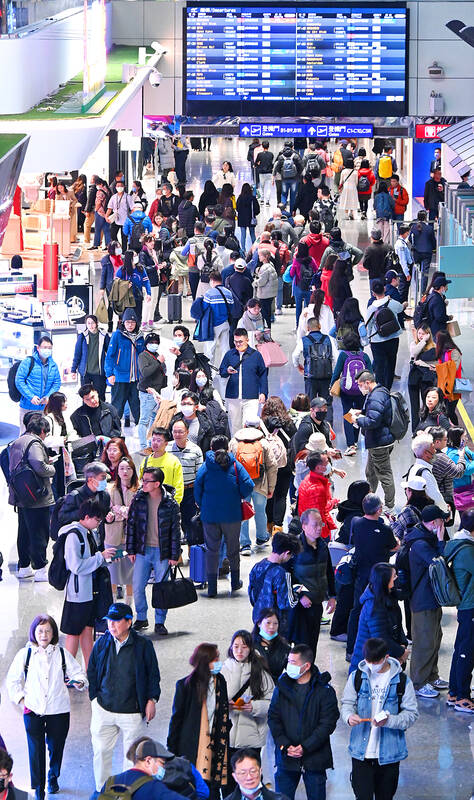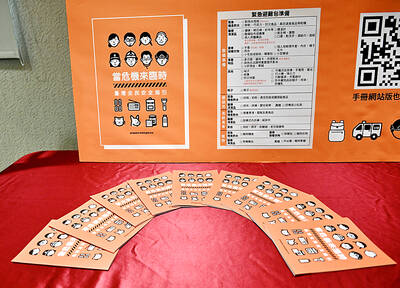The government is considering allowing visa-free entry to transit passengers and granting landing visas to tourists from Southeast Asian countries to attract more international visitors, Vice Premier Cheng Wen-tsan (鄭文燦) said yesterday.
“The nation has about 5 [million] to 6 million transit passengers per year. We will soon finalize how long they can enter Taiwan without a tourist visa. The goal is to make transit passengers an important source of international travelers,” Cheng told participants at a ceremony marking the annual Tourism Festival.
The government is also seeking to further streamline visa application procedures for tourists from Southeast Asian nations by granting them landing visas, provided that national security and other concerns are addressed, he said.

Photo: Liu Hsin-de, Taipei Times
The goal of attracting more Japanese and South Korean tourists to Taiwan remains unchanged, he said.
Visa application procedures vary for tourists entering from nations targeted by the New Southbound Policy, Bureau of Consular Affairs data showed.
Tourists from Australia and New Zealand are visa-exempt for 90 days, while visas for Malaysian and Singaporean tourists are waived for 30 days.
The government is conducting a 14-day visa-free trial for tourists from Brunei, Thailand and the Philippines. The trial is to end on July 31.
Tourists from Indonesia, Vietnam, Myanmar, Cambodia, Laos and India are subject to a dual-track visa application process. Individual travelers can apply for a three-month multiple-entry visa allowing them to stay for up to two weeks each time if they have within the past 10 years held visas issued by the US, the UK, the EU, Canada, Australia, New Zealand, Japan or South Korea, or they had had non-working visas from Taiwan and did not overstay their welcome without legitimate reasons.
Those joining high-quality group tours can use simplified visa application procedures for travel to Taiwan.
Statistics from Taiwan Taoyuan International Airport showed that 35.35 million air travelers accessed the nation’s largest airport last year, 6.25 million of whom were transit passengers.
The number of transit passengers rose 17.5 percent compared with 2019, a record high.
About 38 percent of them were from Southeast Asia.
Cheng also reiterated that the policy on resuming group tours to and from China remains unchanged, although its implementation had been interrupted by some “special events.”
“We hope that everything would soon return to the right track. Both the Mainland Affairs Council and the Ministry of Transportation and Communications have said that they are hoping for a show of goodwill from China by June 1. As long as things are going in the right direction, such as the easing of tensions across the Taiwan Strait or allowing Chinese tour groups to come [to Taiwan], the policy could always change before June 1,” Cheng said.
Minister of Transportation and Communications Wang Kwo-tsai (王國材) said that only goodwill could “turn things for the better.”
“We welcome Chinese tourists and support a healthy and orderly cross-strait tourism exchange,” Wang said. “The ball is in China’s court. What we are expecting is goodwill.”
The government is still committed to attracting 12 million international tourists per year, 2 million of whom would be from China, he said.
The Cabinet has budgeted NT$15.1 billion (US$479.08 million) to improve tourism infrastructure and NT$5.8 billion to promote cycling tourism, he said.
Tourists from Indonesia, Vietnam, Myanmar, Cambodia, Laos and India are subject to a dual-track visa application process. Individual travelers can apply for a three-month multiple-entry visa allowing them to stay for up to two weeks each time if they have within the past 10 years held visas issued by the US, the UK, the EU, Canada, Australia, New Zealand, Japan or South Korea, or they had had non-working visas from Taiwan and did not overstay their welcome without legitimate reasons.
Those joining high-quality group tours can use simplified visa application procedures for travel to Taiwan.

One of two tropical depressions that formed off Taiwan yesterday morning could turn into a moderate typhoon by the weekend, the Central Weather Administration (CWA) said yesterday. Tropical Depression No. 21 formed at 8am about 1,850km off the southeast coast, CWA forecaster Lee Meng-hsuan (李孟軒) said. The weather system is expected to move northwest as it builds momentum, possibly intensifying this weekend into a typhoon, which would be called Mitag, Lee said. The radius of the storm is expected to reach almost 200km, she said. It is forecast to approach the southeast of Taiwan on Monday next week and pass through the Bashi Channel

NO CHANGE: The TRA makes clear that the US does not consider the status of Taiwan to have been determined by WWII-era documents, a former AIT deputy director said The American Institute in Taiwan’s (AIT) comments that World War-II era documents do not determine Taiwan’s political status accurately conveyed the US’ stance, the US Department of State said. An AIT spokesperson on Saturday said that a Chinese official mischaracterized World War II-era documents as stating that Taiwan was ceded to the China. The remarks from the US’ de facto embassy in Taiwan drew criticism from the Ma Ying-jeou Foundation, whose director said the comments put Taiwan in danger. The Chinese-language United Daily News yesterday reported that a US State Department spokesperson confirmed the AIT’s position. They added that the US would continue to

The number of Chinese spouses applying for dependent residency as well as long-term residency in Taiwan has decreased, the Mainland Affairs Council said yesterday, adding that the reduction of Chinese spouses staying or living in Taiwan is only one facet reflecting the general decrease in the number of people willing to get married in Taiwan. The number of Chinese spouses applying for dependent residency last year was 7,123, down by 2,931, or 29.15 percent, from the previous year. The same census showed that the number of Chinese spouses applying for long-term residency and receiving approval last year stood at 2,973, down 1,520,

EASING ANXIETY: The new guide includes a section encouraging people to discuss the threat of war with their children and teach them how to recognize disinformation The Ministry of National Defense’s All-Out Defense Mobilization Agency yesterday released its updated civil defense handbook, which defines the types of potential military aggression by an “enemy state” and self-protection tips in such scenarios. The agency has released three editions of the handbook since 2022, covering information from the preparation of go-bags to survival tips during natural disasters and war. Compared with the previous edition, released in 2023, the latest version has a clearer focus on wartime scenarios. It includes a section outlining six types of potential military threats Taiwan could face, including destruction of critical infrastructure and most undersea cables, resulting in